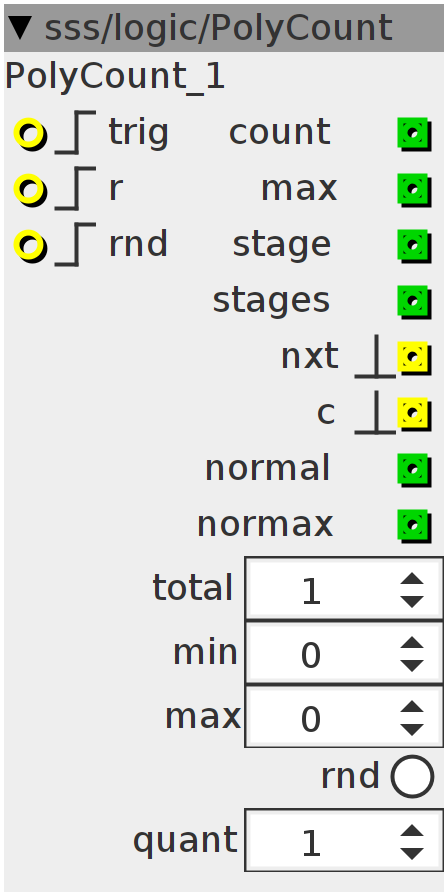PolyCount
random measure generator Set the maximum 'bar'-count with the "total" parameter. min sets the minimum amount of counts per measure max sets the maximum amount of counts per mearuse press random to re-randomise the measures quant quantizes the measure length to whole steps in power of 2,so 8ths->4ths->2s Inputs: TRIGGER: multiple ways: -connect the trigger input to a tempo-synced LFO which gets it's rate multiplied with the max-output of this module. this way measures always take the same time, but you have fills at different rates->polyrhythmic measures: 1/1,2/2,3/3,4/4,5/5 -just connect a LFO to the trigger, this will create measures of different time-length: 1/1,2/1,3/1,4/1 R: r resets the internal count back to zero, useful if its running allongside other sequencers and needs to be reset at the same positions. RND: rnd randomises the whole set of beats-per-measure. OUTPUTS: count: outputs the count-per measure/stage (drive some pattern generator with this) max: outputs the maximum count for the measure/stage (for if pattern generator asks for a maximum count-input) stage: outputs which stage the counter is in (useful for adding variations per measure/stage) c: outputs a trigger when the total-count restarts at 0. normal: outputs the normal total-count normax: outputs the maximum of the total-count (for same use as max output)
Inlets
bool32.rising trigger
bool32.rising reset
bool32.rising rnd
Outlets
int32 count
int32 max
int32 stage
int32 stages
int32 normal
int32 normax
bool32.pulse nxt
bool32.pulse carry pulse
Parameters
int32 total
int32 min
int32 max
int32 quant
bool32.mom rnd
int ntrig;
int rtrig;
int count;
int32_t max[64];
int i;
int stage;
int k;
int strig;
int32_t random;
int RND;
int32_t MAX;
int pk;count = 0;
ntrig = 0;
rtrig = 0;
// max[0]== (int32_t)(GenerateRandomNumber()% 8)+1;
// for(i=1;i<64;i++){
// max[i] = (int32_t)(GenerateRandomNumber()% 8)+1+max[i-1];
// }
RND = 1;int32_t width = param_max - param_min + 1;
outlet_c = 0;
if ((inlet_trig > 0) && !ntrig) {
count += 1;
if (count >= param_total) {
count = 0;
outlet_c = 1;
stage = 0;
MAX = max[0];
}
ntrig = 1;
} else if (!(inlet_trig > 0))
ntrig = 0;
if ((inlet_r > 0) && !rtrig) {
count = 0;
rtrig = 1;
} else if (!(inlet_r > 0))
rtrig = 0;
int rnd = inlet_rnd + param_rnd + RND;
if ((rnd > 0) && !strig) {
RND = 0;
max[0] = (int32_t)(GenerateRandomNumber());
max[0] = max[0] - max[0] / width * width;
max[0] = max[0] < 0 ? max[0] + width : max[0];
max[0] = ((((max[0] + param_min) / param_quant) * param_quant));
for (i = 1; i < 64; i++) {
max[i] = (int32_t)(GenerateRandomNumber());
max[i] = max[i] - max[i] / width * width;
max[i] = max[i] < 0 ? max[i] + width : max[i];
max[i] =
((((max[i] + param_min) / param_quant) * param_quant)) + max[i - 1];
}
strig = 1;
} else if (!(rnd > 0)) {
strig = 0;
}
int32_t Stages;
stage = 0;
k = 0;
for (i = 0; i < 64; i++) {
if (param_total > max[i]) {
Stages = i + 1;
}
}
outlet_stages = Stages;
stage = 0;
k = 0;
for (i = 0; i < 64; i++) {
if (count >= max[i]) {
stage = max[i];
k = i;
}
}
outlet_count = count - stage;
if (!(k == pk)) {
MAX = (max[k + 1] - max[k]) > (param_total - count) ? (param_total - count)
: (max[k + 1] - max[k]);
}
if (count == 0) {
MAX = max[0];
}
outlet_max = MAX;
outlet_stage = k;
outlet_nxt = (!(k == pk));
outlet_normal = count;
outlet_normax = param_total;
pk = k;